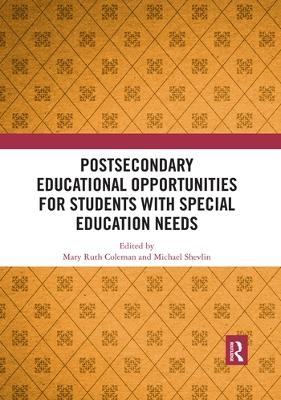
Postsecondary Educational Opportunities for Students with Special Education Needs
Routledge (Verlag)
978-0-367-53100-3 (ISBN)
The decision to go to college is a big one. It signifies a transition into young adulthood and the increasing expectations for independence that can feel exciting, liberating, and daunting! For students with disabilities this transition may be even more challenging. Despite the challenges, more and more students with disabilities are attending postsecondary colleges and universities. While this is certainly encouraging, students with disabilities are less likely to successfully complete their postsecondary programs when compared with their general population peers. So, what do we do? We can learn from our successes during early education and from successful postsecondary programs, taking what we have learned and bring these lessons to scale so that fully inclusive postsecondary programs are available for all students with special education needs. This book was originally published as a special issue of European Journal of Special Needs Education.
Mary Ruth Coleman, PhD, is a Senior Scientist, Emeritus, at the FPG Child Development Institute at the University of North Carolina at Chapel Hill, USA. She directs Project U-STAR~PLUS (Using Science, Talents and Abilities to Recognize Students – Promoting Learning in Underrepresented Students). Michael Shevlin is Professor in Inclusive Education in the School of Education, Trinity College Dublin, Republic of Ireland, and Director of the Trinity Centre for People with Intellectual Disabilities. He has researched widely in the area of inclusive education with a strong focus on establishing inclusive learning environments and facilitating pupil voice within schools.
Guest Editor’s comments Mary Ruth Coleman and Michael Shevlin 1. Inclusive education in higher education: challenges and opportunities Anabel Morñia 2. Academic self-efficacy, sense of coherence, hope and tiredness among college students with learning disabilities Shiri Ben-Naim, Roni Laslo-Roth, Michal Einav, Hadar Biran and Malka Margalit 3. Functioning and participation problems of students with ADHD in higher education: which reasonable accommodations are effective? Dorien Jansen, Katja Petry, Eva Ceulemans, Saskia van der Oord, Ilse Noens and Dieter Baeyens 4. Making the transition to post-secondary education: opportunities and challenges experienced by students with ASD in the Republic of Ireland Sheena Bell, Cristina Devecchi, Conor Mc Guckin and Michael Shevlin 5. Functioning and participation problems of students with ASD in higher education: which reasonable accommodations are effective? Dorien Jansen, Katja Petry, Eva Ceulemans, Ilse Noens and Dieter Baeyens 6. Developing an inclusive learning environment for students with visual impairment in higher education: progressive mutual accommodation and learner experiences in the United Kingdom Rachel Hewett, Graeme Douglas, Michael McLinden and Sue Keil 7. Responding to the needs of students with mental health difficulties in higher education: an Irish perspective Esther Murphy 8. Belonging to higher education: inclusive education for students with intellectual disabilities Kristín Björnsdóttir 9. Re-visiting the role of disability coordinators: the changing needs of disabled students and current support strategies from a UK university Mujde Koca-Atabey 10. Dual PowerPoint presentation approach for students with special educational needs and note-takers Nitin Naik 11. From the voice of a ‘socratic gadfly’: a call for more academic activism in the researching of disability in postsecondary education Jane Seale
| Erscheinungsdatum | 04.05.2020 |
|---|---|
| Verlagsort | London |
| Sprache | englisch |
| Maße | 174 x 246 mm |
| Gewicht | 453 g |
| Themenwelt | Geisteswissenschaften ► Psychologie ► Pädagogische Psychologie |
| Sozialwissenschaften ► Pädagogik ► Allgemeines / Lexika | |
| Sozialwissenschaften ► Pädagogik ► Bildungstheorie | |
| Sozialwissenschaften ► Pädagogik ► Erwachsenenbildung | |
| Sozialwissenschaften ► Pädagogik ► Sonder-, Heil- und Förderpädagogik | |
| ISBN-10 | 0-367-53100-3 / 0367531003 |
| ISBN-13 | 978-0-367-53100-3 / 9780367531003 |
| Zustand | Neuware |
| Haben Sie eine Frage zum Produkt? |
aus dem Bereich


